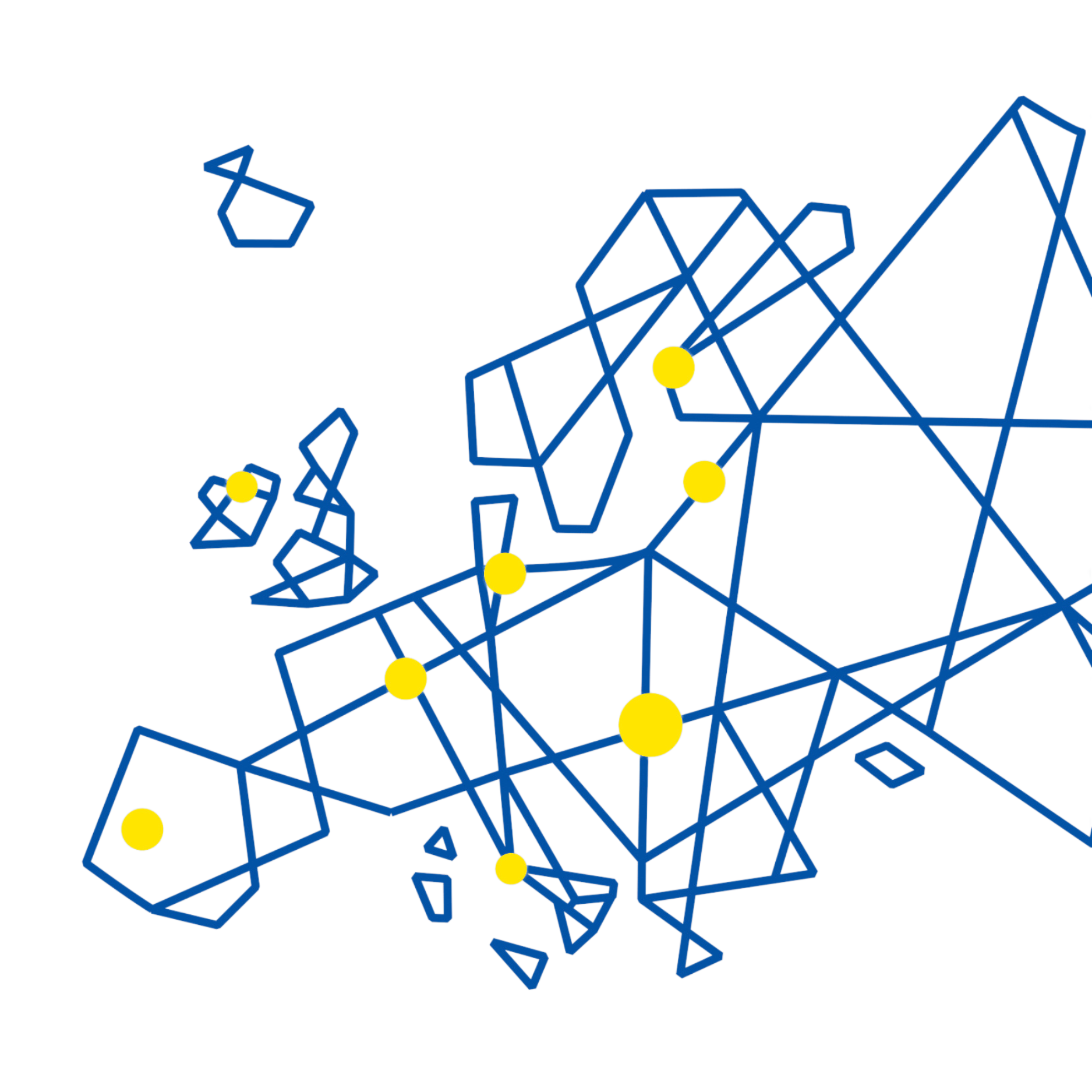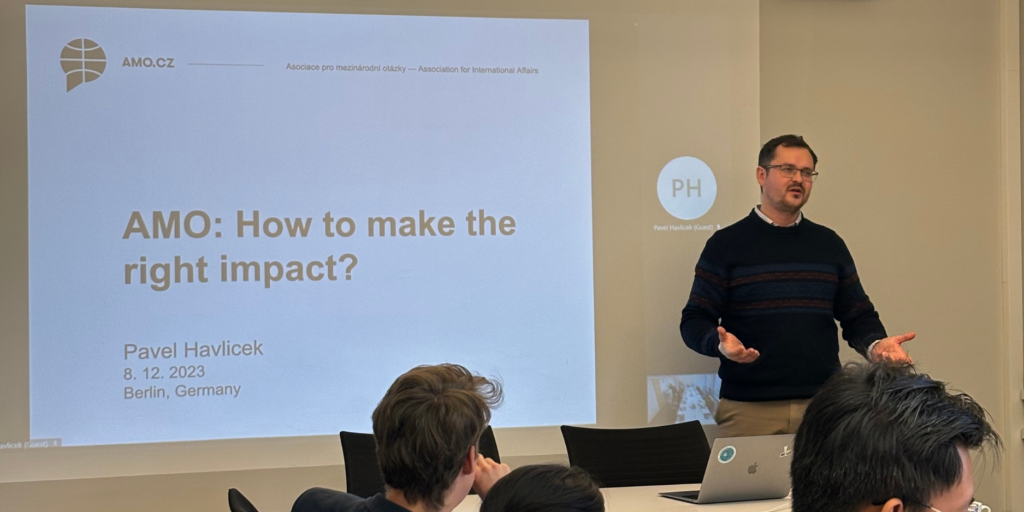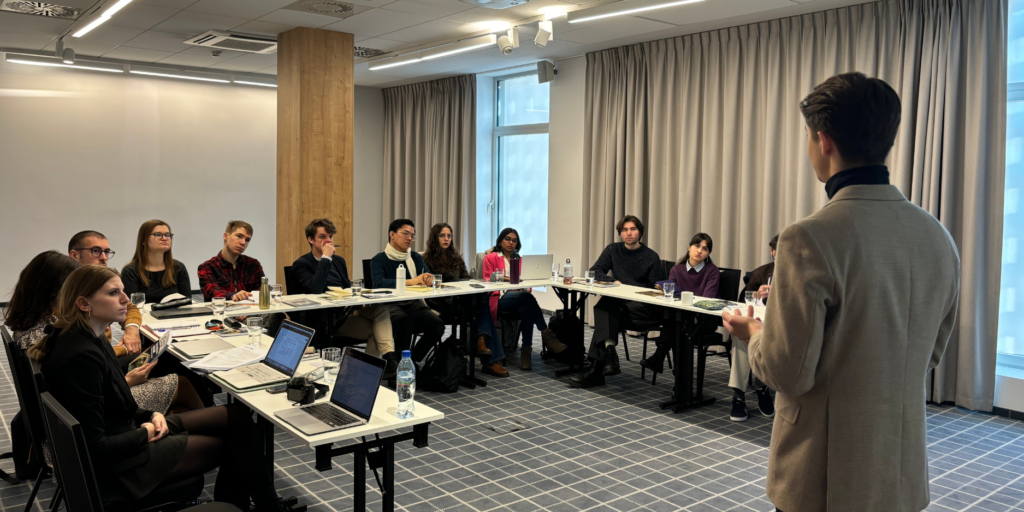Think Tank School

Each year New Eastern Europe and the Jan Nowak-Jeziorański College of Eastern Europe bring together young professionals, researchers, and students to the Think Tank School. This week long programme is designed to provide participants with a better understanding of how think tanks work and what it means to work in these spaces.
Who can apply?
The target audience of the Winter School is young (up to 30 years) and/or aspiring researchers, academics, students who are based in the EU and have desire to learn more about how think tanks and non-governmental organisations work, what is their role in building resilient democracies and gain experience from a Central European perspective.
Regardless of whether you have experience with expert organisations or came up with an idea of founding one yesterday, meeting with trainers from the most active and influential Euro-Atlantic non-governmental organisations and public institutions will help you understand the needs and prospects of your team and ideas. A special focus is also provided from the Central European perspective to give you a chance to learn how other young think tankers have made their careers in this region.

Pavel Havlicek on how to make the right impact as a think tank.
Programme
Think Tank School is an immersive week-long event that goes beyond traditional educational experiences. This is a unique opportunity to explore and contribute to the world of non-governmental organizations, think tanks, and advocacy groups in Central and Eastern Europe. This is a densely packed programme with workshops, presentations, and cultural activities throughout the week, involving travel between multiple Central and Eastern European cities. Throughout this transformative journey, you will have the chance to develop strong personal relationships, extending beyond professional growth. You will be able to engage with activists, academics, and experts and become an integral part of a movement dedicated to driving positive societal changes in the region.
During the programme you will have a chance to participate in workshops led by activists, academics, and experts, providing you with a nuanced understanding of the challenges faced by Central and Eastern Europe. You will be able to receive practical guidance on navigating democracy-building challenges and effectively engaging with the complex issues these organisations address.
Our inaugural project, the New Eastern Europe Winter School took place from December 3 to 9 in Poznań and Berlin, bringing together participants for a week of engaging activities. Throughout the week, various panels featured discussions with members of regional civil society, NGOs, non-profit organisations, universities, and think-tanks, enriching the experience with real-life examples. Speakers included Kacper Nowicki (Varia Posnania), Jan Farfał (Visegrad Insight), Mateusz Sulwiński (Stonewall Group), Patrycja Donaburska (Fulbright Poland), Dagmara Jajesniak-Quast (European University Viadrina), Michael Kurzwelly, Tobias Koepf (Genshagen Stiftung), Angelika Eder (Genshagen Stiftung), Jörg Morré (Berlin-Karlshorst Museum), Joshua M. Burgin, Claudia Rothe (Heinrich-Böll-Stiftung), Joerg Forbrig (German Marshall Fund), Pavel Havlíček (Association for International Affairs), and Krzysztof Izdebski (Fundacja Batorego) contributed valuable perspectives on fostering resilience across Central and Eastern Europe.
New Eastern Europe Think Tank School serves as a platform for insight in careers in political NGOs, research, and think/do-tanks. Learn how think-tanks develop strategies, contribute to their activities as a young researcher, and connect with individuals who share a keen interest in the politics of Central and Eastern European countries.

Kacper Nowicki on Varia Posnania and its activities.
How to apply?
You can find the application on the following link. Deadline for the applications for the upcoming project is April 7, 23:59 CEST.
Our Alumni
Alejandro Esteso Pérez
Alejandro Esteso Pérez is a political analyst and researcher specialised in the Western Balkans and EU enlargement. He has developed his career between EU institutions, the think-tank sector and academia, gathering over five years’ experience in and around the Western Balkans. He currently pursues PhD studies in Political Science at the University of Graz in Austria, and regularly contributes to several media outlets through written analyses and opinion pieces on Western Balkan political affairs and EU integration.
Read what Alejandro has to say about the Think Tank School:
My advice for any future participant at New Eastern Europe’s school is to come with an open mind and an open heart. The diversity of experiences and the intensity of a full-week programme, with Eastern Europe at its core, is what makes this school one of a kind. The inter-personal connections that have been created are there to stay, which is one of the most rewarding parts of this initiative.
Georgii Kalakutskii
Georgy Kalakutskii is a Co-Founder and a Project Manager at thepplan, an organization helping Ukrainians with their job search in Europe. Besides, Georgy is an Educational Project Manager at the Human Rights Centre Memorial and a Public Governance BA student at the Kaunas University of Technology and University of Central Florida.
Read what Georgii has to say about the Think Tank School:
This school is the greatest reminder of why you chose this path. It’s not just the program (which is an absolute masterpiece ofc) but also the people around you. It’s about time you’ll listen to the professionals in the field and rightfully imagine yourself in their place doing things differently (or continuing their path). Either way, this week is an immense learning experience.
William Malaterre
William Malaterre is an Erasmus Mundus Joint Master Degree student in European Politics and Society (EPS). After attending Charles University and Leiden University, he is spending his 2nd year at the Jagiellonian University. With his British-French background, William has focused on how to build a stronger European framework in the areas of security and migration, related to human and democratic rights.
Read what William has to say about the Think Tank School:
The Winter School from the New Eastern Europe has enabled me to grow more confident amidst exploring the world of non-governmental organisations. Indeed, I now better understand the missions and roles behind working at a think-tank, as well as know of its possible shortcomings. I also greatly appreciated being surrounded by like-minded people, all interested in building strong professional and personal relationships throughout this journey. It was also rewarding to gain so much knowledge on Central and Eastern Europe, from my peers and trip activities. So, if you are considering a career in the non-governmental world in Central and Eastern Europe, this is an incredible week-long event to immerse yourself in!
Wicke van den Broek
Wicke van den Broek is currently a PhD candidate at Maastricht University, researching democracy promotion in Belarus. He received his education in the four Visegrad countries at the College of Europe in Natolin, the Jagiellonian University, Masaryk University, the University of Pecs and the Matej Bel university in Banska Bystrica. Before his PhD, Wicke was a trainee at the European Border and Coast Guard Agency in Warsaw.
Read what Wicke has to say about the Think Tank School:
This Winter School of New Eastern Europe shows why it is important to bring like-minded activists from diverse backgrounds together. Throughout the sessions and exchanges, the rightness of the participants’ cause for democracy, diversity and human rights was clear; their ingenuity and drive to achieve this was visible at every step of the way; the very practise and technicalities to overcome challenges posed was there. To be a part of this Winter School means having the honour to being and staying part of this movement for freedom, rights and democracy for all, not least in Central and Eastern Europe!
Catherine Girard
Catherine Girard is currently pursuing her PhD in Political Science at Masaryk University in the Czech Republic. Her PhD specializes in Security and Strategic Studies, and her research lies at the intersection of gender, radicalization, and extremism within the context of far-right movements. In parallel, Catherine is also the Communications Manager for GLOBSEC, a think-tank based in Slovakia.
Read what Catherine has to say about the Think Tank School:
Hearing from activists, academics, and experts during the workshops of New Eastern Europe’s inaugural Winter School truly deepened my understanding of the intricate challenges that this region faces, and their commitment and innovative approaches to creating meaningful change left me inspired and optimistic. The Winter School also provided us with the perfect platform to connect with others working toward bettering Central and Eastern Europe, to develop friendships, and lay the groundwork for future collaborations.
Lika Khutsiberidze
Lika Khutsiberidze is a second-year Master’s student of European Politics and Society, the Erasmus Mundus programme jointly run by Charles University, Leiden University, and Jagiellonian University. She previously earned her BA in International Relations from Ivane Javakhishvili Tbilisi State University in Georgia. Lika has 2-year working experience as an analyst at Georgia’s Reforms Associates, a non-governmental policy watchdog and multi-profile think tank in Tbilisi, Georgia. She researched anti-Western and pro-Russian disinformation and propaganda; contributed to reports, fact-checking articles and newsletters monitoring and assessing the disinformation ecosystem in Georgia. Lika’s academic interests cover Central and Eastern Europe, EU enlargement, Georgia-EU relations and the EU’s security and defence system. She has been actively involved in community projects and has cross-cultural experiences, as she spent several semesters as an exchange student at the University of Bremen, Germany and Otterbein University, the US.
Read what Lika has to say about the Think Tank School:
What makes this winter school exceptional is not just the opportunity to learn from esteemed speakers, but also the chance to gain insights from intelligent student peers who possess creative ideas and share a passion for driving positive societal changes on issues we all deeply care about. If you aspire to work (or create one) for impactful NGOs, think tanks, watchdog and advocacy groups, or policy research institutions in the future, you should certainly consider applying to this enriching winter school. It offers a warm, welcoming, and safe space that encourages participants to ask questions and receive a practice-based guidance on how to effectively engage with the democracy-building challenges these organizations tackle daily.
Muhammad Anugrah Utama
Muhammad Anugrah Utama (Tama) is a first year Master’s student in European Studies (Euroculture) at the University of Groningen in the Netherlands and the Jagiellonian University in Poland. They are an Associate Editor at the Student Think Tank for Europe-Asia Relations (STEAR) and their research interests include EU-ASEAN relations, Central-Eastern Europe, postcolonialism, human rights and LGBTQIA+.
Read what Tama has to say about the Think Tank School:
The New Eastern Europe Winter School was a space for me to discover myself, (re-)discover my interest, and to build meaningful connection among like-minded peers. As someone from the Global South interested in CEE, the session and outside workshop discussion never fails to amaze me on how our interest tends to collide, but the approach might be different. Trust me, it is a great place to learn and to explore further not only about Central and Eastern Europe but also think tank life in general, whether you are a professional or a newcomer just like me!
Sneha Chakrabarti
Sneha Chakrabarti completed her bachelors in Economics under the academic direction of London School of Economics and Political Science (LSE). Currently she is a final year MA. student at Jagiellonian University, studying International Security and Development while specializing in development. Her research interests includes the critical issue of migration driven by climate change in South Asia. She is an avid reader and a big foodie.
Read what Sneha has to say about the Think Tank School:
If someone is looking to dive deep into the world of think tanks, this six day Winter School is for you. The event featured intellectually stimulating workshops, enriching debates, and created numerous beautiful memories. Reflecting on the impactful experience, I’m already looking forward to the possibility of being a part of the Winter School again next year. If given the chance, I would undoubtedly sign myself up again.
Natalia Szymańska
Polish, but born and raised in Spain for most of her life, Natalia Szymańska is a recent graduate with a BA in International Relations and Area Studies at the Jagiellonian University. While a horse passionate in her free time, she is currently the Assistant Manager for the Future University Lab, a think tank within one of the leading European University Alliances known as Una Europa. Her role is to promote and disseminate information about the importance of the Future UniLab within Una Europa, but also to other European alliances.
Read what Natalia has to say about the Think Tank School:
The first edition of the New Eastern Europe Winter School was something I did not know I needed! The organizers realized the importance of the networking element when the winter school was being designed, and I believe that element was achieved to the fullest! These six days were packed with travelling through four different locations across two neighbouring countries while twelve participants were getting to know each other through workshops, mutual presentations, group discussions, and informal dinners and lunches. Besides providing a wide range of speakers from many different fields, the coordinators of the New Eastern Europe Winter School managed to get some of these speakers to join us for informal networking as well, which has allowed us to increase our presence in the so-called ‘outer world’. A totally recommended experience that every person interested in think tanks and NGOs should consider applying for!
Aliaksei Piatrenka
Aliaksei Piatrenka is a Belarusian civic activist and an undergraduate student in political science at the University of Bucharest. He has 3+ years of experience as a copywriter in the media. Assistant for the Center for New Ideas’ research “Media image of Belarus” in 2022 and 2023. Unofficial ambassador of Belarus in Romania.
Read what Aliaksei has to say about the Think Tank School:
New Eastern Europe School is a great opportunity if you’re starting (or would like to start) your career in political NGOs, research or think/do-tanks. During the first edition of the school I gained useful insights on how think tanks develop their strategies, how I, as a young researcher, can contribute to their activities, met wonderful people and found out why pasta with chicken is a bad idea. Sounds intriguing? Apply now!
Giorgia Cacciotti
Giorgia Cacciotti is a recent graduate from the Joint Master’s Degree in East European and Eurasian Studies (MIREES) run by the University of Bologna, Vytautas Magnus University, and the University of Zagreb. She is involved in different third-sector realities focusing on intercultural learning, migration, and civic engagement. Her main interests concern securitization matters, political movements in Russia, Ukraine, and Belarus, diaspora politics and activism.
Read what Giorgia has to say about the Think Tank School:
The New Eastern Europe Winter School has been an opportunity to foster meaningful professional and personal relations. Each workshop has been insightful and encouraging. Connecting with fellow young professionals has been a highlight in fostering a dynamic learning environment. Looking at all the people I have met on this journey, I could feel that the future of the Central Eastern European region is nothing but bright. One suggestion for future candidates, do not let any professional insecurity prevent you from making the most out of it!
Merili Arjakas
Merili Arjakas is a junior research fellow at the International Centre for Defence and Security, a think-tank in Tallinn, Estonia. She joined ICDS in December 2021, and since 2023, she has also served as the editor-in-chief of Diplomaatia, ICDS’ foreign and security policy magazine. Her research focuses on European Union affairs, and she is particularly interested in the interplay between domestic and international politics, exploring how various dynamics influence societies in Europe and the Middle East. Additionally, she held the position of Marcin Król Fellow (2021-22) at Visegrad Insight, where she continues to provide analyses on Estonian politics and their implications for Central and Eastern European affairs. Merili holds a BA degree in contemporary history and an MA degree in international relations and European Union affairs from the University of Tartu. She has also studied the Israeli-Palestinian conflict at the Hebrew University of Jerusalem and US foreign policy at George Mason University. Currently, she is engaged in the study of French language and culture at the University of Tallinn.
Read what Merili has to say about the Think Tank School:
I am grateful to New Eastern Europe for providing us with the opportunity to connect with amazing individuals from around the world, all sharing a keen interest in the politics of Central and Eastern European countries. The discussions, spanning from early morning workshops to debates well after dinner, allowed for engaging conversations that were at times serious, at times lighthearted, but always allowed us to broaden our minds and learn something new.
The project is funded by the European Commission under the Citizens, Equality, Rights and Values Programme (CERV) thanks to the Operating Grant titled “Protecting European Values – A proactive approach to strengthening and building European democracy by countering hostile threats aimed at EU values and bridging existing divides.”














































